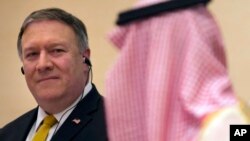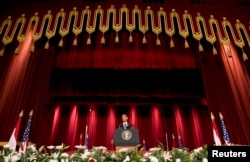ທ່ານ ໄມຄ໌ ພອມພຽວ, ລັດຖະມົນຕີກະຊວງການຕ່າງປະເທດສະຫະລັດ ໄດ້ແນໃສ່ເລື້ອງອີຣ່ານແລະກຸ່ມລັດອິສລາມໃນຂະນະທີ່ທ່ານກຳລັງຢ້ຽມຢາມເຂດ
ພາກຕາເວັນອອກກາງເປັນເວລານຶ່ງອາທິດຢູ່ນີ້.
ທ່ານ ພອມພຽວເວົ້າກ່ອນທີ່ທ່ານຈະໄປແວ່ຈໍແດັນຊຶ່ງເປັນບ່ອນທຳອິດວ່າ ທ່ານຢາກ "ສົ່ງຖ້ອຍຄຳທີ່ຈະແຈ້ງໃຫ້ຮູ້" ວ່າສະຫະລັດມີຄວາມມຸ້ງໝັ້ນອັນແນ້ວແນ່ຕໍ່ຂົງເຂດດັ່ງກ່າວ, ຕໍ່ການເອົາຊະນະກຸ່ມລັດອິສລາມ ແລະຕໍ່ການຕ້ານສິ່ງທີ່ທ່ານເອີ້ນວ່າ "ການເຄື່ອນໄຫວຂອງອີຣ່ານເພື່ອເຮັດໃຫ້ຂາດສະຖຽນລະພາບ" ນັ້ນ.
ໃນການໂອ້ລົມກັບ ບັນດາຜູ້ນຳຂອງຈໍແດັນນັ້ນ ຄາດກັນວ່າ ທ່ານ ພອມພຽວ ຈະສົນທະນາ ກ່ຽວກັບສະຖານະການໃນຊີເຣຍ ບ່ອນທີ່ລັດຖະບານທ່ານທຣຳ ກຳລັງວາງແຜນທີ່ຈະຖອນທະຫານຂອງສະຫະລັດ 2,000 ຄົນອອກຈາກທີ່ນັ້ນ ພ້ອມທັງສົນທະນາກ່ຽວກັບການເຊື່ອມໂຍງທາງເສດຖະກິດຂອງຈໍແດັນກັບອີຣັກ, ທີ່ເປັນປະເທດເພື່ອນບ້ານກັນນັ້ນ.
ການແວ່ຢ້ຽມຢາມແຫ່ງອື່ນໆຂອງຫົວໜ້າຝ່າຍການທູດລວມມີ ອີຈິບ, ສະຫະລັດອາຣັບເອມີເຣັສ, ກາຕ້າ, ຊາອຸດີ ອາຣາເບຍ, ໂອມານ ແລະຄູເວດ.
ທ່ານ ພອມພຽວ ມີກຳນົດຈະກ່າວຄຳປາໄສ ຢູ່ໃນນະຄອນໄຄໂຣວ່າ ກະຊວງການຕ່າງປະເທດສະຫະລັດຈະສຸມໃສ່ "ຄວາມມຸ້ງໝັ້ນຂອງສະຫະລັດຕໍ່ສັນຕິພາບ, ຄວາມວັດທະນາຖາວອນ, ສະຖຽນລະພາບ ແລະຄວາມໝັ້ນຄົງຢູ່ໃນຂົງເຂດພາກຕາເວັນອອກກາງ."
10 ປີກ່ອນໜ້ານີ້, ແມ່ນປະທານາທິບໍດີບາຣັກ ໂອບາມາ ທີ່ທຳການກ່າວຄຳປາໄສອັນສຳຄັນ ຢູ່ໃນນະຄອນໄຄໂຣບ່ອນທີ່ທ່ານຫາທາງ "ເລີ້ມຕົ້ນໃໝ່ຂອງການພົວລະຫວ່າງສະຫະລັດກັບຊາວມຸສລິມ ຢູ່ທົ່ວໂລກ."
ນັບແຕ່ໄດ້ຂຶ້ນກຳຕຳແໜ່ງຂອງທ່ານພາຍຫລັງການສິ້ນສຸດສະໄໝຂອງທ່ານໂອບາມາເປັນຕົ້ນມາ, ປະທານາທິບໍດີດໍໂນລ ທຣຳ ໄດ້ເດີນຕາມເສັ້ນທາງນະໂຍບາຍທີ່ແຕກຕ່າງໄປຈາກເສັ້ນທາງທີ່ຜູ້ຮັບຕຳແໜ່ງກ່ອນໜ້າທ່ານໄດ້ເຮັດມາ ຊຶ່ງ ລວມທັງການລົບລ້າງສັນຍາດ້ານນີວເຄລຍ ທີ່ສະຫະລັດ ແລະອີກ 5 ປະເທດ ໄດ້ເຊັນກັນກັບອີຣ່ານ ເພື່ອຈຳກັດໂຄງການນີວເຄລຍຂອງອີຣ່ານນັ້ນ.
ຝ່າຍອື່ນໆ ຢູ່ໃນສັນຍາດັ່ງກ່າວເວົ້າວ່າ ສັນຍານັ້ນ ເປັນວິທີການທີ່ດີທີ່ສຸດທີ່ຈະຮັບປະກັນໄດ້ວ່າ ອີຣ່ານບໍ່ສາມາດພັດທະນາອາວຸດນີວເຄລຍໄດ້, ຊຶ່ງເປັນສິ່ງທີ່ອີຣ່ານເວົ້າວ່າ ຕົນເອງພະຍາຍາມທີ່ຈະບໍ່ເຮັດນັ້ນ. ອົງການສິ້ງຊອມດ້ານອາວຸດນີວເຄລຍຂອງສະຫະປະຊາຊາດ ໄດ້ຢືນຢັນຢູ່ໃນບົດລາຍງານຫລາຍສະບັບວ່າ ອີຣ່ານໄດ້ເຮັດຕາມຄຳເວົ້າຂອງຕົນ ຢູ່ໃນສັນຍານັ້ນ.
U.S. Secretary of State Mike Pompeo is focusing on Iran and Islamic State as he makes a week-long visit to the Middle East.
Pompeo said ahead of his first stop Tuesday in Jordan that he wants to "send a clear message" that the United States is committed to the region, defeating Islamic State and countering what he called "Iran's destabilizing activities."
In his talks with Jordanian leaders, Pompeo was expected to discuss the situation in Syria, where the Trump administration is planning to withdraw 2,000 U.S. forces, as well as Jordan's economic links with neighboring Iraq.
Other stops on the top U.S. diplomat's trip include Egypt, Bahrain, the United Arab Emirates, Qatar, Saudi Arabia, Oman and Kuwait.
Pompeo is due to give a speech in Cairo that the State Department says will focus on "U.S. commitment to peace, prosperity, stability and security in the Middle East."
Ten years ago, it was President Barack Obama making a major address in Cairo, where he sought "a new beginning between the United States and Muslims around the world."
Since taking office at the end of Obama's term, President Donald Trump has taken different foreign policy paths than those of his predecessor, including abandoning the nuclear agreement the United States and five other nations struck with Iran to limit the Iranian nuclear program.
The other parties of the agreement say it is the best way to make sure Iran cannot develop nuclear weapons, something Iran has said it was not trying to do. The United Nation's nuclear watchdog has certified in multiple reports that Iran is living up to its part of the deal.
Trump criticized the deal as giving Iran too much while demanding too little and says it leaves Iran with a path to nuclear weapons.
"We're actually going to set a policy that's actually going to stop Iran from getting nuclear weapons," Pompeo told reporters traveling with him. "That's probably the most important thing that we're expecting to achieve."
Pompeo said he will be discussing with leaders at his various stops the ways in which the governments can "apply pressure" to get Iran to change its behavior.
His stops in the United Arab Emirates and Saudi Arabia will also include a focus on the war in Yemen, where Saudi and UAE forces are helping Yemen's government fight Houthi rebels.
The United States has provided support to the Saudi-led coalition, including refueling for warplanes conducting airstrikes.
Last month, the U.S. Senate sent a strong signal of displeasure with Saudi Arabia by passing resolutions calling for an end to U.S. support for the Saudi military campaign and blaming Saudi Arabia for the death of Washington Post journalist Jamal Khashoggi.
Khashoggi was killed when he visited the Saudi consulate in Istanbul, Turkey in October. Initially Saudi Arabia said he safely left the site on his own, but later admitted he was killed there in what Saudi officials called a rogue operation.
Saudi Arabia has charged 11 people in connection with the killing.
The State Department said Pompeo would be seeking an update on the status of the Saudi investigation.






